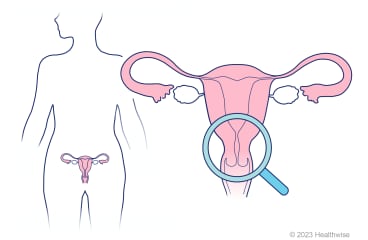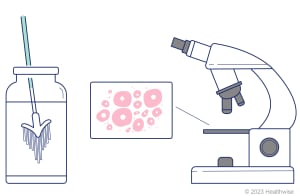Cervical cancer screening helps prevent cervical cancer. The tests include the Pap test and the HPV (human papillomavirus) test. These tests may be used alone or together. You and your doctor can talk about what screening test is best for you.

The cervix is the lower part of the uterus that opens into the vagina.

The Pap test checks for changes in the cells on the cervix. The HPV test looks for high-risk viruses that can cause cell changes that could lead to cervical cancer.
When should you have a screening test?
Depending on your age, your risk of cervical cancer, and your results from previous tests, you may need cervical cancer screening. Here is a general guide for when screening may be recommended.

Ages 21 to 65
- A Pap test. Starting at age 21, you may get this test. If your results are normal, you can wait 3 years to have another test.
- An HPV test. Starting at age 25, you may get this test. If your results are negative, you can wait 5 years to have another test.
- A Pap test and HPV test. Starting at age 30, you may get both. If your results are normal, you can wait 5 years to be tested again.

Ages 66 and older
- Talk to your doctor. If you've always had normal screening results, you may not need screening.

If you had a hysterectomy
- Talk to your doctor. Depending on your health history, you may not need screening.
What do the results mean?

A normal Pap test means that there were no cell changes on your cervix. A negative HPV test means that no high-risk HPV viruses were found.

Pap results may show minor changes to the cells on your cervix or cell changes that could turn into cancer. Minor changes may go away on their own. Tests could also show that you have a high-risk type of HPV.
What to do next
Talk to your doctor if you have any questions about your results. The doctor will go over the next steps and when to do them. You may need more tests or treatment.
Follow-up care is a key part of your treatment and safety. Be sure to make and go to all appointments, and call your doctor if you are having problems. It's also a good idea to know your test results and keep a list of the medicines you take.
Where can you learn more?
Go to http://www.healthwise.net/patientEd
Enter P919 in the search box to learn more about "Learning About Cervical Cancer Screening".
Current as of: October 25, 2023
Author: Ignite Healthwise, LLC Staff
Clinical Review Board
All Healthwise education is reviewed by a team that includes physicians, nurses, advanced practitioners, registered dieticians, and other healthcare professionals.

